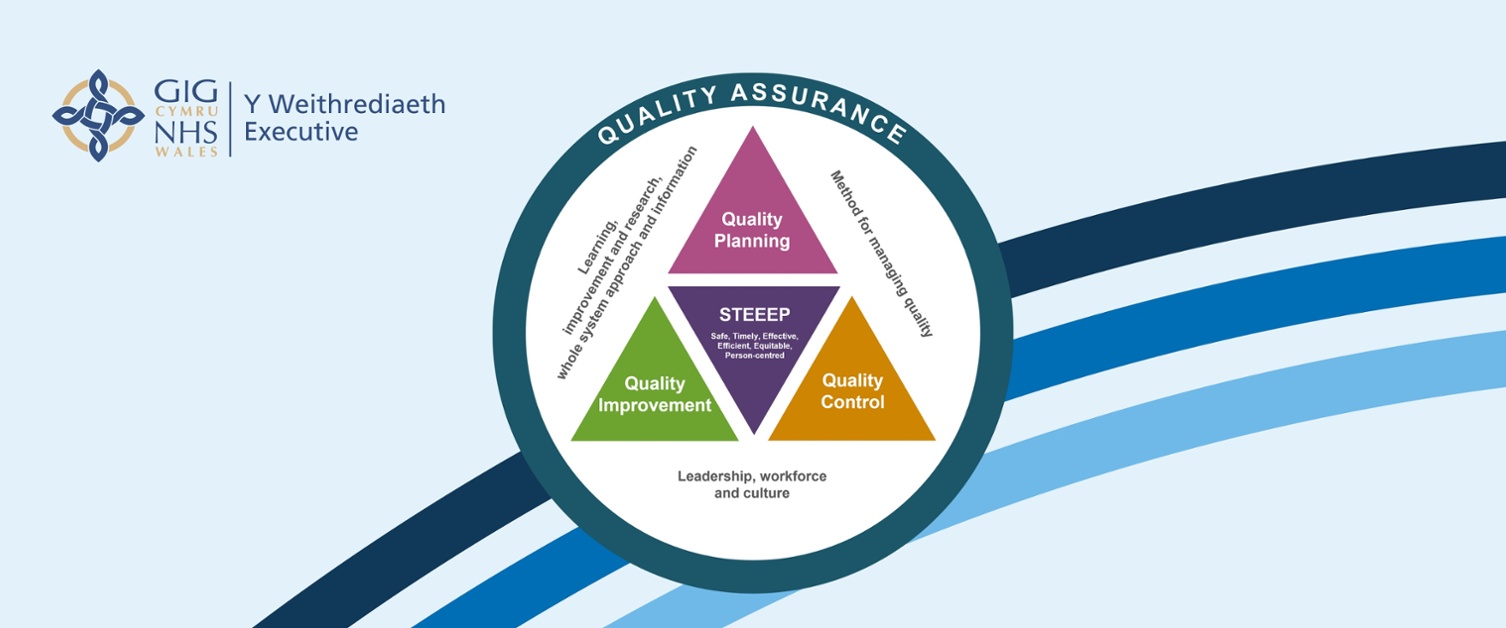Quality Management Systems Hub

This Hub brings together information and materials to support individuals and teams who are developing and implementing a Quality Management System (QMS) in their organisations.
This Hub builds on growing evidence and policies across the UK and internationally which recognise that health organisations need to shift from a focus on quality improvement to take a broader approach to managing and improving quality.
In Wales, the Health and Social Care (Quality and Engagement) (Wales) Act 2020 includes a duty of quality which came into force in April 2023. This duty requires all health bodies in Wales to report on their quality journey and as part of this, establish a QMS. This Hub is designed to help you to do this.
In addition, QMS features as a prominent thread through the Safe Care Partnership, which includes a Duty of Quality Leaders Workstream with a dedicated focus on QMS.
What is a Quality Management System?
While the terminology ‘QMS’ may be new to you, you will likely recognise aspects of quality management in your own work and across your organisation, such as quality planning or quality improvement.
In NHS Wales, we have developed the following definition for QMS by analysing the latest developments in the literature and from extensive stakeholder engagement:
Definition of QMS for NHS Wales
An operating framework to continuously, reliably and sustainably meet the needs of the population we serve.
Essentially, a QMS brings together four key aspects – quality planning, quality improvement, quality control and quality assurance – and coordinates the interconnectivity between these aspects to achieve high quality care. In line with the duty of quality, quality care for NHS Wales is defined as safe, timely, effective, efficient, equitable and person-centred.
This echoes the Institute for Healthcare Improvement’s drive towards whole system quality, which emphasises quality as the organisational strategy, rather than a component of it.
“In healthcare the problem is people are exposed to quality through projects and through this emergence of quality in healthcare that is much more as a separate thing. Whereas people in business, quality was the way you do business. [...] a lot of times in hospitals there are quality people, there are quality activities, there is quality stuff. But it is not necessarily the way that the organisation is managed or run.”
The Four Aspects of a QMS
Learning from QMS in practice
The following resources outline how organisations have applied an effective QMS and what they have learnt as part of the process.
Developing whole-organisation QMS in healthcare
This report from the Health Foundation gathers insights from QMS across the UK and Ireland and shares recommendations and learnings for those embarking on or sustaining their own QMS. Includes:
- Case studies from Aneurin Bevan University Health Board (Wales), NHS Lanarkshire (Scotland) and Leeds Teaching Hospitals NHS Trust (England) amongst others
East London NHS Foundation Trust (ELFT)
This short video outlines ELFT’s QMS approach and shows how different groups of people contribute to the delivery of an effective QMS. This includes roles for:
- team leaders and managers
- team members
- consultants and senior clinicians
- senior leaders
- service users or carers
ELFT has also produced this short video to demonstrate a QMS through a control chart.
Healthcare Improvement Scotland
This report from Healthcare Improvement Scotland recognises that the delivery of high-quality care requires an organisational approach that goes beyond quality improvement and presents a national QMS framework for Scotland.
Improvement Cymru
This video of an online Q visit outlines Improvement Cymru’s five-year journey to date of developing and testing a QMS. Dominique Bird, Acting National Director for Quality, Safety and Improvement in NHS Wales, and Felicity Hamer, Head of Strategic Quality and Safety, outline what they’ve learnt from testing the approach in two NHS Wales organisations.
How we are supporting you
The opportunities and learning for adopting a QMS and the requirements for NHS Wales organisations were highlighted by executives and senior leaders in attendance at the Safe Care Partnership co-design event in October 2024.
A review of these discussions enabled key requirements to be mapped to five interconnecting areas of work, designed to meet the identified support required for progressing NHS Wales on its journey to embedding QMS. These include:

|
Convening a QMS learning network of nominated organisational representatives to share ideas and experiences and enable collaborative and continued learning |

|
Creating this Hub of resources and tools, and developing a repository of good practice for use from team to board |

|
Prototyping a care group or directorate implementation of QMS within NHS Wales with a view to share learning and bring QMS to life for spread and scale; this will include teaching and coaching support |

|
Developing staff education packages based on the identified needs e.g., an introduction to QMS at all levels and how to use data for quality |

|
Board development sessions, to upskill and support boards to understand their unique contribution within a QMS |
Contact us
If you’d like to discuss any of the above support or provide feedback on this Hub (including additional resources that may be helpful), we would love to hear from you.
You can email us at: NHSWHC.Qualityandsafety@wales.nhs.uk